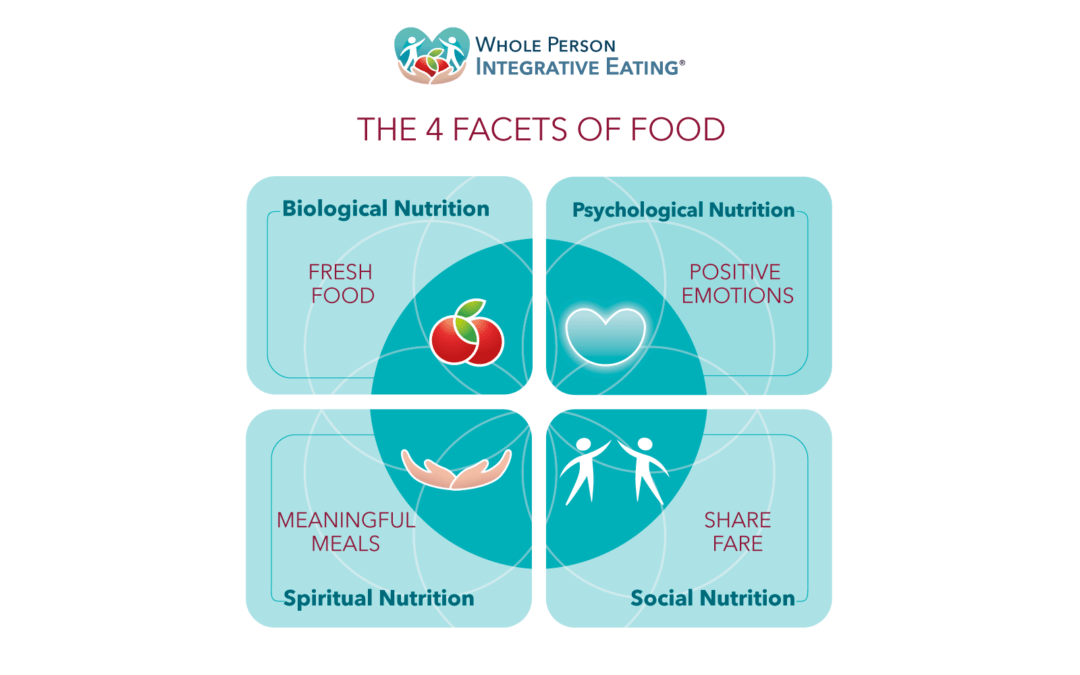For millennia, humankind turned to food to nourish physical, emotional, spiritual, and social well-being. Today, modern nutritional science is verifying food is, indeed, a 4-part gift with the power to heal multidimensionally.
—By Deborah Kesten
Losing weight and eating healthfully are two of the most popular New Year’s resolutions. It’s understandable, because millions of us struggle to overcome overeating and overweight, often without success.
What if you never again need to make a New Year’s resolution to lose weight or ‘go on a diet’ because your most-of-the-time way of eating empowers you to eat less and weigh less throughout the year?
The science-backed Whole Person Integrative Eating® (WPIE) program I founded with behavioral scientist Larry Scherwitz, PhD, is reshaping our understanding of what to eat and the under-recognized importance of how to eat for weight loss and well-being. In a study we did with 5,256 people, I identified Four Facets of Food associated with eating less and weighing less. Without dieting.
Meet the 4 Facets of Food
I discovered the Four Facets of Food when I researched ancient food wisdom from major world religions; cultural traditions (such as the Mediterranean diet); and Eastern healing systems (traditional Chinese medicine, etc.)—sources humankind turned to for guidelines about optimal eating prior to the discovery of nutritional science in the 20th century.
What emerged is this insight: Food is a four-part gift that nourishes physically (Biological Nutrition), while also acknowledging its harder-to-measure healing dimensions, such as its link to emotions (Psychological Nutrition), the meaning in meals (Spiritual Nutrition), and community (Social Nutrition). The four-facet way of eating is the foundation of our scientifically sound Whole Person Integrative Eating program to eat less and weigh less—without restrictive dieting.
Ancient Food Wisdom, Modern Nutritional Science
Here’s a closer look at the Four Facets of Food—and some scientific studies that are verifying that each facet influences weight, health, and healing—often in unexpected ways.
FOOD FACET #1: Biological Nutrition
The Biological Nutrition facet explores the influence of nutrients (vitamins, minerals, antioxidants, etc.) on the body. It includes analysis of healing plant-based food (fruit, veggies, whole grains, legumes, nuts and seeds) versus today’s health-harming Standard American Diet (SAD) of mostly animal-based, ultra-processed food (UPF).
The research. Scores of studies link a mostly plant-based diet to weight loss, health and healing, while today’s new-normal diet of fast food, UPF, and animal-based foods ups the odds of weight gain and chronic diet-linked conditions.
FOOD FACET #2: Psychological Nutrition
The facet of Psychological Nutrition is a growing medical specialty that investigates the link between food we eat and emotions; and conversely, how thoughts and feelings often affect food choices.
The research. What the new science of ‘food and mood’ teaches us is this: What you eat each day can lead to feel-good feelings and to mental and emotional well-being; or it can up the odds of negative emotions, such as depression and anxiety. The choice is yours.
FOOD FACET #3: Spiritual Nutrition
The three ‘ingredients’ of the Spiritual Nutrition facet of Whole Person Integrative Eating include eating with mindfulness, gratitude, and loving regard for food.
The research. From losing weight to less binge eating and better digestion, more and more studies link a “mindfulness consciousness” to eating less and enhanced health.
FOOD FACET #4: Social Nutrition
The Social Nutrition facet of WPIE is about the health and weight loss benefits that food can bring when you eat with others in a pleasant atmosphere.
The research. Close family ties and strong community connection have been linked with a low rate of heart disease—even when a high-fat diet is the norm; while more and more research connects eating alone with increased odds of overweight and obesity.
The Healing Benefits of ‘Whole Person’ Nourishment
The Four Facets of Food reconnect us with timeless food wisdom our ancestors discovered centuries ago. Today, modern nutritional science is verifying that when you nourish ‘all of you’—physically, emotionally, spiritually, and socially—when you eat, you may make ‘go on a diet’ resolutions obsolete.

